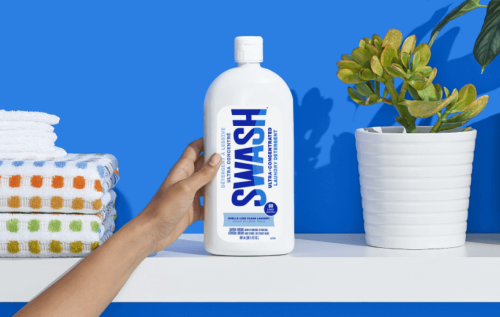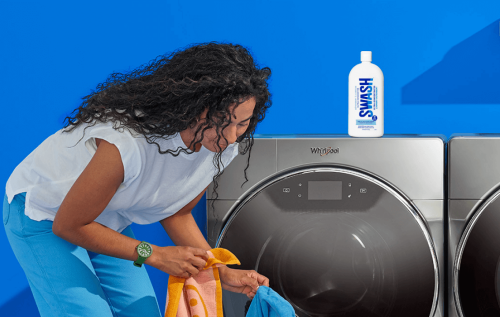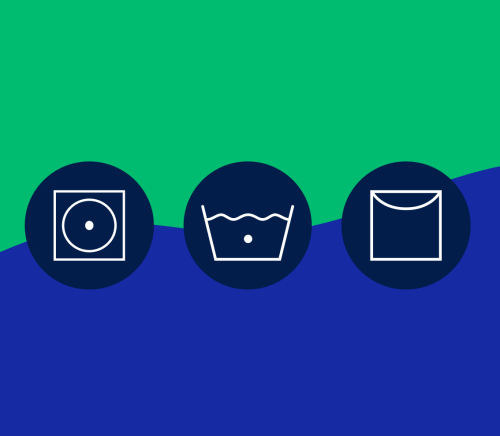

How Often Should You Wash Your Sheets?
Most experts recommend cleaning bed sheets an average of once a week. This wash schedule is generally recommended to help keep your sheets free from build-up such as body oils, skin cells and pollen. Sheets should be washed on the hottest water setting your fabric will tolerate - be sure to check the laundering directions on your sheets before washing.
While cleaning bed sheets on a weekly schedule is recommended, it can also pose a bit of a challenge to your laundry routine. If you’re not able to wash one set of sheets weekly, consider investing in one or two more sets that you can rotate on a weekly basis. Keep your clean sets of sheets stored in a cool, dry place so they’re ready for immediate use.


Why is cleaning sheets important?
Because sheets come into prolonged contact with your body each night, they can easily harbor things like body oils, dead skin cells, and even pollen that’s carried indoors via your hair. In addition, dust mites living in your sheets can trigger allergies. Frequent washing can help eliminate these issues.
In addition to thorough washing, it’s also important to dry your sheets thoroughly to kill dust mites and prevent mold and mildew while in storage. Many experts also recommend ironing your sheets before putting them away, as the steam and heat can help further eliminate allergens.


How should I clean my bed sheets if they’re made from something other than cotton?
Cotton sheets are a popular choice, thanks to their durability and breathability. However, some people prefer sheets made from a variety of materials, including silk, satin and polyester. Before establishing a cleaning schedule for these types of sheets, read the fabric care instructions to see what type of cycle and water temperature should be used for their care.
- How often should I wash my linen bed sheets? Like cotton, linen sheets should be washed weekly.
- How often are you supposed to clean silk sheets? Silk sheets don’t have to be washed as frequently as cotton or linen. You can clean them every two weeks as opposed to weekly.
- How often should flannel sheets be washed? Flannel sheets should be washed weekly, using warm water instead of hot.
- How often should you clean satin sheets? Satin sheets can be cleaned once every two weeks, though extra care should be taken. Wash your satin sheets in cold water on a delicate cycle, then either line dry them or place them on a low cycle in your dryer.
- How often should you wash your polyester sheets? Polyester sheets should be washed every two weeks. Like flannel, polyester sheets should be washed in warm water, rather than hot.


Should you wash new bed sheets?
Before putting new sheets on your bed, it’s always a good idea to wash them first. Prior to being packaged, new sheets are often treated with a starch that helps them look crisp in their packaging. However, this starch can be irritating to the skin. Washing sheets prior to use removes it.
What type of detergent should I use for cleaning bed sheets?
The answer to this question depends on the type of sheets you own, as well as your washing machine. Some fabrics, such as satin, need a detergent that is specially formulated for delicate items. Before washing your sheets, check the fabric care label to determine what type of detergent is best.
When it comes to cleaning, both the type of detergent and the amount you use is important. High efficiency, or HE, washing machines use specially formulated detergent that cleans clothes without creating too many suds. HE detergents can also be ultra-concentrated, which means you don’t need to use as much to achieve the same results. To prevent detergent overdosing, consider using detergents that are easy to measure. Swash® detergent features packaging that makes it easy to dispense the right amount of detergent every time. Simply use one squeeze for a medium or regular load, or two squeezes for a large load.


How often should I wash my other bedding, like pillows and blankets?
Sheets aren’t the only part of your bed that should be cleaned regularly! In addition to regularly cleaning your sheets, you should also ensure that the following items are washed on a regular basis:
Pillows: Two to four times a year
Blankets: Every two weeks
Duvet covers: Weekly
Comforters: Once or twice a year
No matter what type of bedding you’re washing, it’s important to use the right detergent for the job. Swash® detergent is designed for both regular and HE washers and comes with a convenient Precision Pour Cap that makes measuring easy so you get the right amount of detergent for every wash. Available in Pure Linen and our Free and Clear unscented version, Swash® can help you achieve great results with every load. Explore Swash® detergent and find the right version for your laundry room today.
Learn More About Swash®
-
 How to Design an Organized Laundry Room | Swash Discover how Mailia Vago from The Motherhood Kind thinks about designing a laundry room for maximal organization and intention.
How to Design an Organized Laundry Room | Swash Discover how Mailia Vago from The Motherhood Kind thinks about designing a laundry room for maximal organization and intention. -
 How Often Should You Wash Your Sheets? Learn how often to properly wash your sheets for optimal hygiene. Find out how often, as well as tips and tricks, for getting your sheets clean and fresh.
How Often Should You Wash Your Sheets? Learn how often to properly wash your sheets for optimal hygiene. Find out how often, as well as tips and tricks, for getting your sheets clean and fresh. -
 What Do Laundry Symbols Mean? Understanding the laundry symbols to wash, dry, bleach, iron or dry clean clothes can be tough. Here’s a guide for what these clothing care symbols mean.
What Do Laundry Symbols Mean? Understanding the laundry symbols to wash, dry, bleach, iron or dry clean clothes can be tough. Here’s a guide for what these clothing care symbols mean.